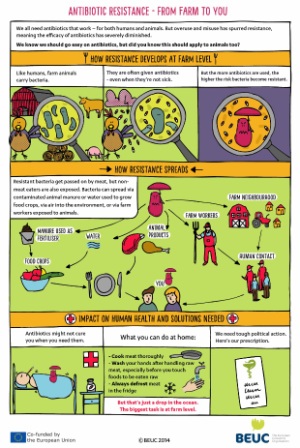European Parliament adopts new EU law to cut farm antimicrobial use
About this publication
PRESS STATEMENT - 25.10.2018
Today, the plenary of the European Parliament adopted a long-awaited law which will restrict the use of antimicrobials in food-producing animals and thus help to fight antimicrobial resistance.
 The European Consumer Organisation (BEUC) welcomes that under the new rules, the routine preventive use of antimicrobials will in principle be prohibited. Use of antimicrobials in healthy animals will be allowed solely on an exceptional basis, for instance after surgery, and in individual animals only. Yet, when some animals in a group are sick, it will still be permitted to treat the entire group with antimicrobials to avoid the spread of an infection or disease. Unfortunately, the law does not state that this practice too should be exceptional.
The European Consumer Organisation (BEUC) welcomes that under the new rules, the routine preventive use of antimicrobials will in principle be prohibited. Use of antimicrobials in healthy animals will be allowed solely on an exceptional basis, for instance after surgery, and in individual animals only. Yet, when some animals in a group are sick, it will still be permitted to treat the entire group with antimicrobials to avoid the spread of an infection or disease. Unfortunately, the law does not state that this practice too should be exceptional.
The Commission will draw up a list of antimicrobials to be reserved for treatment of humans only. The updated legislation also imposes new obligations on Member States for the collection of data on both the sales and the use of antimicrobials per animal species, however those are only to be phased-in very gradually.
Finally, third country producers exporting animal products to the EU will have to respect the ban on antimicrobial use for growth promotion and the new restrictions on those antimicrobials which are vital in human medicine. It is expected the new law will enter into force in early 2019.
BEUC Director-General, Monique Goyens reacted:
“This new EU law is a significant answer to a looming health crisis. As the World Health Organisation itself noted, antimicrobial resistance is one of today’s biggest global health threats.
“EU consumer groups have long been advocating for an end to the routine preventive use of antibiotics in farm animals. Vital antibiotics should be reserved for treating infections in people. Both will become reality now and this is very good news.
“It is only fair that our trading partners should follow the same rules as EU farmers when they export their meat to Europe. Meat imported to the EU should not be derived from animals which are fed antibiotics to stimulate their growth – and the industry’s profits.
“We welcome that all Member States will be required to collect data not just on the sales, but also on the actual use of antimicrobials per animal species. But it is disappointing these obligations will not apply before several years.
“As the latest data published by the European Medicines Agency (EMA) shows1, action to cut antibiotic use in food-producing animals has been uneven across EU Member States. Good data allowing country comparison is key to identifying best practices and ensuring all Member States step up their game to end the improper use of antibiotics in farming.”
ENDS
[1] The latest ESVAC (European Surveillance of Veterinary Antimicrobial Consumption) report found that, overall, sales of veterinary antimicrobials across Europe have decreased by more than 20% between 2011 and 2016. Yet, while sales of veterinary antimicrobials dropped in 16 of those 25 countries that provided data for 2011-2016, six countries recorded sale increases during the same period.

